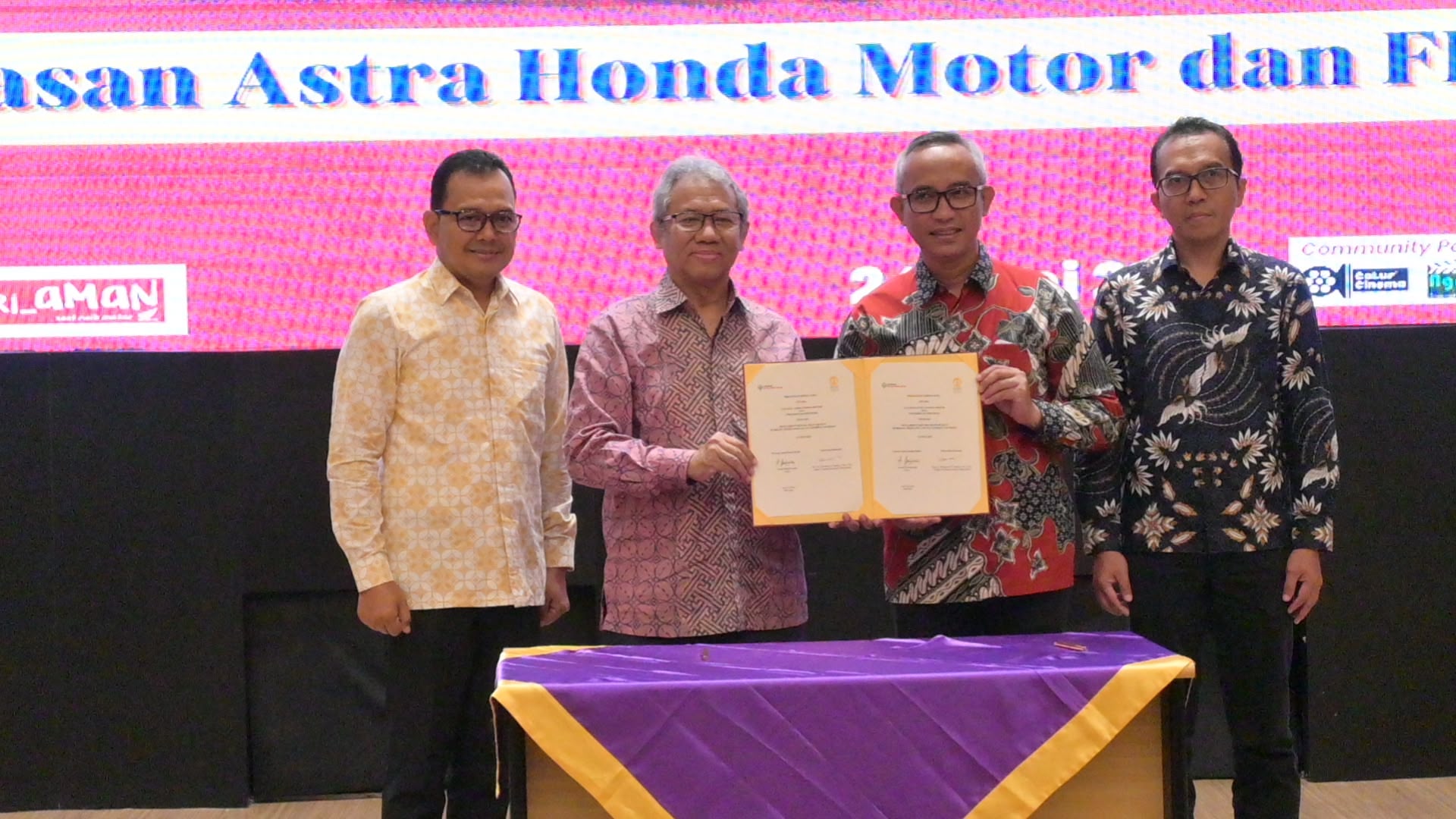Traffic accidents remain a major challenge to public health and well-being. According to WHO, approximately 1.19 million people die and 20–50 million sustain nonfatal injuries annually due to road traffic incidents. In Indonesia, the number of accidents has steadily increased over the past five years, with more than 152,000 cases and 27,000 deaths recorded in 2024, according to national traffic police data. These conditions highlight the urgent need for cross-sectoral collaboration to foster a culture of road safety.
As part of its commitment to promoting such a culture, the Faculty of Public Health, Universitas Indonesia (FPH UI), officially partnered with the Astra Honda Motor Foundation on Tuesday, June 24, 2025, at UI’s Makara Art Center. The memorandum of understanding (MoU) was signed by the Dean of FPH UI, Prof. dr. Mondastri Korib Sudaryo, M.S., D.Sc., and the Chair of the Astra Honda Motor Foundation, Ahmad Muhibbuddin. This collaboration marks the beginning of programs for education, research, and the strengthening of a road safety promoter network on campus and in the wider community. As a symbolic gesture to launch the collaboration, the UI Vice-Rector for Infrastructure and Facilities, Agus Setiawan, S.Kp., M.M., D.N., struck a gong and presented jackets to ten selected road safety agents who will serve as safety ambassadors at UI.
This event also served as the opening of the Talkshow ExpoSURE!, organized by the Student Association of the Occupational Health and Safety (OHS) Undergraduate Program at FPH UI as part of the 16th Occupational Health Safety Expo. Under the theme “Making Sure with ExpoSURE!: How People Get Used to Safety Culture by #SafeRideWithPride,” the event aimed to promote a new mindset that views safe driving as a vital part of daily life, especially among the academic community at UI. The event also featured a performance of the traditional dance Tatranesa by FPH UI students.
In his remarks, Agus Setiawan emphasized that UI must set an example in developing a civilized society—one of the indicators being traffic behavior. “UI is a miniature of Indonesia. Ensuring the security, safety, and health of our academic community is our core responsibility. That’s why this campaign for road safety is so important, especially considering the high number of traffic accidents occurring around UI, particularly during active academic periods,” he said.
Prof. Mondastri echoed this sentiment, stating that ExpoSURE! is more than just a discussion forum—it is the first step in building long-term collaboration to raise awareness about road safety. “We see road safety as an integral part of occupational health sciences, which is one of FPH UI’s core academic fields. This event is a valuable moment to expand education, shape behavior, and strategize through cross-sectoral collaboration and research,” said Prof. Mondastri.
The Astra Honda Motor Foundation (YAHM) reaffirmed its commitment to promoting road safety. Ahmad Muhibbuddin shared that YAHM has long been dedicated to road safety education, including training instructors and activists at various educational levels. “We believe young people play a central role in fostering a safety culture. With nearly 200 certified instructors, we continue to partner with educational institutions and law enforcement to drive a nationwide movement,” he explained.
The Talkshow ExpoSURE!, moderated by Sarah Sentoso, B.Com., MPA. (Puteri Indonesia DKI Jakarta 3, 2025), featured expert speakers from various sectors experienced in road safety issues.
Mila Tejamaya, S.Si., M.O.H.S., Ph.D., Director of Campus Welfare at UI, emphasized the need for adults to reinforce safety values in both campus and family environments. Prof. Dr. Guritnaningsih, a traffic psychology expert, agreed, while Prof. Dr. dr. Zulkifli Djunaidi, M.App.Sc., Professor of OHS at FPH UI, stressed the importance of instilling life values as the foundation for road safety culture. “We must convey that driving safely is an achievement. Building a sense of pride in safety helps ensure it becomes a way of life, not a burden,” he stated. Brig. Gen. Pol. Dr. Bakharuddin Muhammad Syah, S.J., S.IK., M.Si., Director of Security and Safety of the National Traffic Police, also underscored the importance of inter-institutional synergy in creating a holistic and sustainable traffic safety culture.
Risk management on the road is guided by the 3E concept: Engineering, Education, and Enforcement. Engineering includes risk mapping based on factors such as traffic flow, road environment conditions, and proximity to public facilities, which informs the installation of signs and monitoring devices like CCTV. Education focuses on embedding safety values through schools, transport providers, social media, and other platforms to build awareness from a young age. Enforcement consists of consistent law enforcement by authorities and social enforcement—changing risky driving behaviors through public pressure, such as social stigma or shame-based consequences.
By signing the MoU and organizing ExpoSURE!, FPH UI, Astra Honda Motor Foundation, and partner institutions have reaffirmed their commitment to fostering a safe and sustainable driving culture—and to making road safety an essential part of modern living. (DFD)

